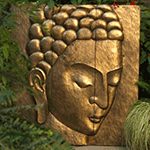There is no benefit in performing any actions,
spiritual or otherwise,
without love, awareness and commitment.
Dhammapada verse 312.
Dhamma healing
At one time, during my early years of teaching in Budh Gaya, an English lady arrived on retreat and during her private interview casually informed me that she was a healer. This was a relatively new idea for me as such terms were not used by my teacher whom I believe would have dismissed such things without much consideration. Later, as she was leaving my room, I asked if, at the end of the retreat, she would explain to me what she meant by healing.
She politely asked me why, and I replied that I would be interested to know something about it as such a concept was quite new to me.
“But you’re a healer,” she said.
“Me?” I answered in astonishment, “what do you mean?”
“Everything you do and say is so filled with so much compassion and kindness that your loving energy fills the Dhamma Hall, and from that, everyone benefits and so everyone is healed, in one way or another.
“Oh,” I said, stunned, “thank you,” and she left.
I reflected upon her words for some time, and finally accepted that when we commit fully to Dhamma training the powerful qualities of love, compassion and kindness naturally manifest and so bring benefit to all beings.
However, this Is only the Buddha’s teaching of right speech (Samma Vaca) and right conduct, (Samma Kammanta) and the sharing of this pure Dhamma with all who come to hear.
“If you want to be happy in your life, you have to cultivate a loving heart,” so said my teacher when we first met in that semi darkened monastery Dhamma hall more than forty two years ago. Since that moment and under his direct guidance, those few words have been my guiding Dhammic principle.
In short, my Dhamma is love!
Of course, understanding the subtlety and depth of Dhammic love may many take years of letting go or putting down our romantic views and often disappointing ideas of what love is, until we intuitively recognize its reality as unconditional acceptance of the universe and all it contains in each and every moment. In this place we are in peace. No longer fighting with the world to get what we want, but to our surrendering into Dhammic wisdom, and then responding.
We do not have the power to control the universe so that it always suits our desires, and so, in order to be free, we must accept the reality of the moment, and then lovingly and wisely respond.
Beings are the way they are and that is their choice, but you are the way that you are, and that is your choice, so how are you choosing to be?
This is an important personal question, how are we choosing to be? What do we prioritise, not only as a vague concept in our life, but as a moment-to-moment practice?
‘The Path is straight, but people love to be side-tracked,’ says the Tao te Ching, and it is that very ‘side-tracking’ into anger, fear, doubt and hostility that always takes us away from peace and so, clear seeing. But so does attachment, desires and social, religious and gender demands.
Dhamma means truth, and how can we fight against truth?
The mind arises and passes away in each moment, and what seemed so important in one moment is seen as empty in the next, but nevertheless, we build a world on these delusions and insist that all others see, understand and accept our personal point of view.
Our only option is to harmonize with truth and flow with the reality as it manifests moment after moment. To put down our ideas of self and its struggle with life, and to let go. To share our loving, non-self-involved presence with all beings and so bring a Dhamma healing to the world.
May all beings be happy.
*******
Koan:
The Master asked the student, “where have you come from?”The student relied, “from the south.”The Master asked, “how is Dhamma in the south?”
“There is a lot of discussion,” answered the student.
“But, how can that discussion compare to me planting vegetables to eat?” said the Master.
“Yes, but what can you do about the world?” asked the student.The Master replied, “what do you call the world?”
Dhamma Quotation:
At the very heart of spiritual practice is meditation, the turning away from the world of ego and the senses, and the investigation of mind and body.
From Higher than happiness. By Michael Kewley

